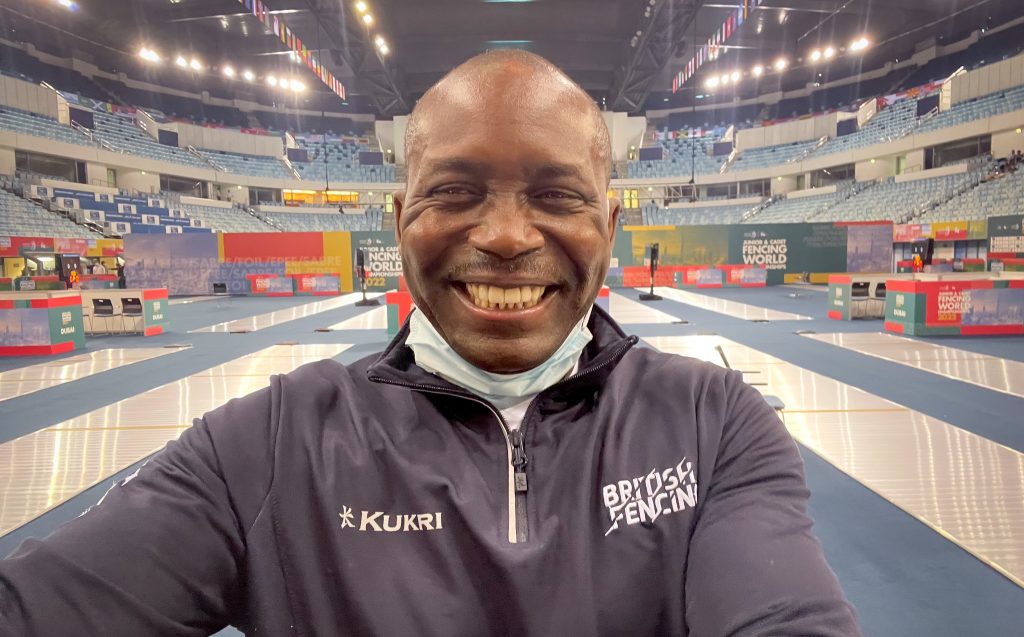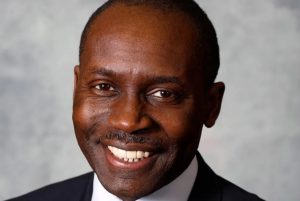

Obituary by Malcolm Fare

James Williams, who has passed away at the age of 57 after a short illness, was perhaps the most talented sabreur Britain has ever produced.
He joined the army at 16 and soon proved himself a fine all-round sportsman, making regimental teams in football and athletics, becoming an instructor in unarmed combat and the first non-commissioned officer to captain the army fencing team.
He went on to win the British sabre championship twice (1996 & 2000), was runner-up three times (1994, 1999 & 2002) and also bronze medallist three times (1992, 1997 & 1998).
James fenced in three Olympic Games (1992, 1996 & 2000) and nine consecutive world championships from 1993 to 2003. He was the only British sabreur to qualify for the Atlanta Games in 1996, where he lost in the last 32 to Charikov of Russia when the referee gave Charikov three doubtful hits in succession at 11-all.
At the Sydney Games in 2000, James knocked out the world No. 5, Nemczik of Hungary to reach the last 16. It was the best British Olympic sabre result of his generation, but he subsequently lost to Frossine of Russia for a place in the last eight.
In his profile of James in the October 2003 issue of The Sword, Richard Cohen quoted Peter Frohlich, former Hungarian national coach, who coached James for more than a decade, saying, “If he had been part of the Hungarian system from the beginning … he would have been in the top eight fencers in the world.”
Cohen also recalled an incident at the 1992 Budapest World Cup event where James beat the American No. 1 Peter Westbrook, bronze medallist at the 1984 Olympics. On the subway returning to their hotel, they found themselves in a carriage with three skinheads who started to ‘eyeball’ James. “Two stops from the hotel, the skinheads got out and one pulled James out with him just as the train doors closed.
At the next station, Richard and coach Mike Matthews dashed round to the other side and caught a train back to where James had been train-napped. They were greeted by a strange sight: two of the skinheads were sprawled on benches, rubbing their heads and other injured parts; the third had disappeared. Of James there was no sign; it transpired that he had dealt with all three attackers in short order and was sauntering back to the hotel on foot.”

British Fencing chief executive Georgina Usher MBE remembers: “When we competed in multiple European and World Championships together, James always brought joy and happiness into a squad space. Official bus transports would give him the captive audience that brought out the showman. My favourite memory is of him standing at the front of a large packed coach forcing everyone (including very confused international fencers) to join him in renditions of On Ilkla Moor Baht ‘at, the unofficial anthem of Yorkshire (he was born in Huddersfield).
In 2020 he joined the British Fencing board and took on a number of responsibilities to help and support BF and the fencing community. His decision in 2023 to take on the role of Olympic Team Manager was a reflection of how much he still passionately believed in the ability of our sport and our athletes to deliver success for Great Britain on a global stage and wanted to support that in whatever way he could.”
BF president Hilary Philbin MBE said: “Very few fencers have achieved as much, and given back as much, as James. He was a hugely popular and well-respected figure at home as well as in international circles and was a truly excellent ambassador for British Fencing.”

Outside of fencing, Williams was a major figure in local government as the Director of Public Health for Medway Council in Kent.
He played an instrumental role in tackling the Covid pandemic in Medway. The council leader Vince Maple described Williams as “an inspirational leader” who had left “an impressive legacy”. The deputy leader Teresa Murray said he was “an Olympian in all senses… James’ leadership of Medway’s response to Covid-19 was extraordinary and exemplary. He will be incredibly missed.”
Three Kent MPs, Dame Tracey Crouch, Rehman Chishti and Kelly Tollhurst – described James as the area’s “greatest health advocate”. In a joint statement, they said: “He championed public health improvements in every shape and form and he reached out privately when we have faced our own heath challenges.”
He is survived by his wife Marie and his daughters Lauren and Amber.
James Williams
16 October 1966 – 12 May 2024
Details of James’ memorial service are here.
The BF charity is raising money in memory of James to support fencers from disadvantaged backgrounds – you can contribute here.
Tributes have poured in from fencers, parents and coaches all over the world. We have included a selection here; all tributes and condolences received have been passed on to his family.
Hilary Philbin MBE, British Fencing President, writes: “It was with great sorrow that I learnt of the tragic and sudden passing of James at such a young age.
James’ contribution to fencing has been immense, with far too many achievements to be listed here. I first knew him when he was making his mark as a sabre fencer, reaching the top 16 of the Olympic Games and the senior World Championships, before carving out a career as a successful coach. James had so many strings to his bow, serving in numerous capacities over the years with the FIE, the British Olympic Association and British Fencing – including as a Director on the Board. Very few fencers have achieved as much, and given back as much, as James – and I have no doubt that he would have gone on to achieve even greater things.
James was a hugely popular and well-respected figure at home as well as in international circles and was a truly excellent ambassador for British Fencing. On a personal level, it was always a great pleasure to be in his company. He will be very much missed by all who knew him, and I offer my sincere condolences to his family and his many friends.”
Mark Lyttle, Chair of the BF Board, said: “James was a passionate and enthusiastic member of the BF Board for the last four years. As someone who had reached to pinnacle of the sport, he was so ready to give back selflessly at all levels. We will miss him dearly. Our thoughts are with his family and friends at this time.”
Jim McManus, of the Association of Directors of Public Health, said: “James was a talented public health leader, a great colleague and someone who shared his learning and wisdom gently and generously. He had an assured, friendly and confident presence when Directors of Public Health met, either together or with government. Always constructive, he had a passion for the health of his population that was palpable. I always learned from him and valued his insight, his energy and his care.”
Miriam Luke, MBE, writes: “I knew James as very active member of the BOA Athletes Commission. He was a real advocate for his sport and represented athletes with a passion. He was also great fun to have both in meetings and at the various visits we made to sports venues.”
Ian Williams, fellow GB team mate and close friend, remembers when he first met James. “Around 1987/88, this young soldier came with one of his army friends to train with us at London Thames Fencing Club; over the next 36 years we shared an amazing journey, first as fencers and then as coaches.
Throughout our fencing careers we were rivals, but when the matches finished we were close friends again. As we shared the same surname, we joked on the World Cup circuit that we were brothers and the truth is that in many respects he was like a brother to me. … he always had your back. When James’s competitive career came to an end, he turned to coaching and we were reunited again, working together for GBR, the famous Grantham sabre camps and later at Camden Fencing Club.
His ‘can do’ attitude meant that he accomplished an incredible amount during his lifetime. I’ll miss the fist bumps, followed by “nice, nice” or to hear “I’m getnit”, but most of all I’ll miss his friendship. James would not want us to be sad, he was a very strong character, Mr Positive, and would light up a room with his energy, and of course his humour and cheeky grin!”
Kirk Zavieh, another GB team mate, recalls an incident at the 1993 world championships in Essen: “We were in an elimination round against the Italians, a team that included Giovani Scalzo and Marco Marin, both Olympic medallists. The match starts, they play it cool as we win the first bout, then the second, they equalise and move ahead 4-3. The Italians always bring a crowd and they were collectively shouting at the end of every hit, arguing with the president. Amin Zahir goes on against Marin, who complains about each hit against him.
Anyway, in the final hit the Italian steps forward and does a head attack; Amin at the last second does a well-timed prime parry riposte – super clear, he has won the bout. As Amin turns round, revealing the back of his head (his mask was still on), Marin does a chest cut in anger, realising he has lost the bout and I think (to be fair to him) did not intend to cut into the back of Amin’s head, but he did. Amin does not initially notice anything, but blood starts to pour onto the back of his white jacket. Quite a dramatic scene. He looks as if he has felt nothing in the intensity of the fight, but then touches his head with his glove, looks at his hand (mask still on) and sees it full of blood.
He turns back around to face Marin…and pulls his mask up. This is not going to be pretty. Amin remonstrates with Marin, who pushes him away, Amin pushes him back, at which point both teams rush on to the piste. A sea of angry Italians with fists ready and fingers pinched in the gesture mano a borsa.
Suddenly, someone saw James. He was approaching and he wasn’t happy. It was as if he was parting the water. The Italians backed off. I have never seen so many angry people suddenly start smiling and apologising gratuitously. “We are sorry, yes no problem, no problem James!” That was so funny, a wonderful moment. James had a reputation and they knew he meant business.”
Tommy Curran Jones, BF Board Director and GBR epeeist, recalls: “I first met James when he was a commentator during the UK School Games. I’ll never be able to go for a foot hit without hearing him on the tannoy saying “Curran Jones strikes like a viper”. It was my pleasure to work with him on the board of British Fencing too, where he brought passion along with a remarkable politeness and a total commitment to developing our sport.”
US Olympic sabreur Keeth Smart writes: “From the moment I joined the World Cup fencing tour, I wanted to have the heart that James displayed in fighting for every touch. Over the years, I got to know him quite well, as we travelled around the world chasing our Olympic dreams. We had countless dinners together and James was a true joy. He was always approachable and always brought a smile to my face when he fought so hard in scoring upset after upset.”
Ziemek Wojciechowski said: “With the passing of James Williams we have lost a great fencer, coach, leader, speaker and a man of deep knowledge and understanding of high performance sport, a person who inspired so many British fencers and coaches.”
Tunde Akinyosoye writes: “Ever since James took my son Folayemi and Ian Ho under his wing at Brentwood School, he was instrumental in helping shape the boys into the fine young sportsmen they’ve become. He instilled humility, discipline and responsibility and always made them recognise the potential they carried within themselves. I vividly recall him making it clear to both boys that he wouldn’t accept them showing up at competitions with incomplete fencing kit, saying it was their responsibility, not their parents’, to ensure that every piece of kit required was brought along.”
Ian Ho, GBR sabreur, writes: “I was fortunate enough to have James Williams coach me for my whole fencing career. His positive and enthusiastic attitude was infectious. He was a role model that anyone would strive to emulate.
From when I first met him at 11 years old to my current age of 20, he has taught me so much – not only how to fence, but also the importance of diligence, discipline and self-confidence. I will miss his lessons, his pre-comp pep talks and especially his dynamic and energetic piste-side coaching.”
David McDougall writes: “As both a colleague at Camden and the father of a young fencer, I can’t stress enough what a positive and motivational influence James has been on both me and Alicia. His belief and confidence has helped her excel this year, manifested not only in her British U14 sabre championship gold, but also in her progress and resilience at school. He typified the best of coaching – a mentor, a guide, a champion of people and a source of unwavering confidence and positivity.”
Eva Aziz-Picardet remembers: “James was always an inspiring coach, whether it was his competition tips or his training playlists. He used to ask me what animal I wanted to portray through my fencing and told me to be a lioness, to show my inner aggressiveness and to never let anyone step over me. This is what will remind me of him, knowing I am the lion he inspired me to be.”
Alice Lancaster writes: “I have been struggling to find the words to express the enormity of losing James. He has been ‘with’ me in some form for my entire fencing career. When I was a baby-fencer at ten he was someone I idolised, when Peter Frohlich (also James’s coach) started to coach me I felt some of that reflected brilliance and then as a GBR fencer I felt I was treading a path that he had trodden before.
When I returned to fencing as a coach, he believed in me when I didn’t always believe in myself and, because he saw my potential, I began to see it too.”
